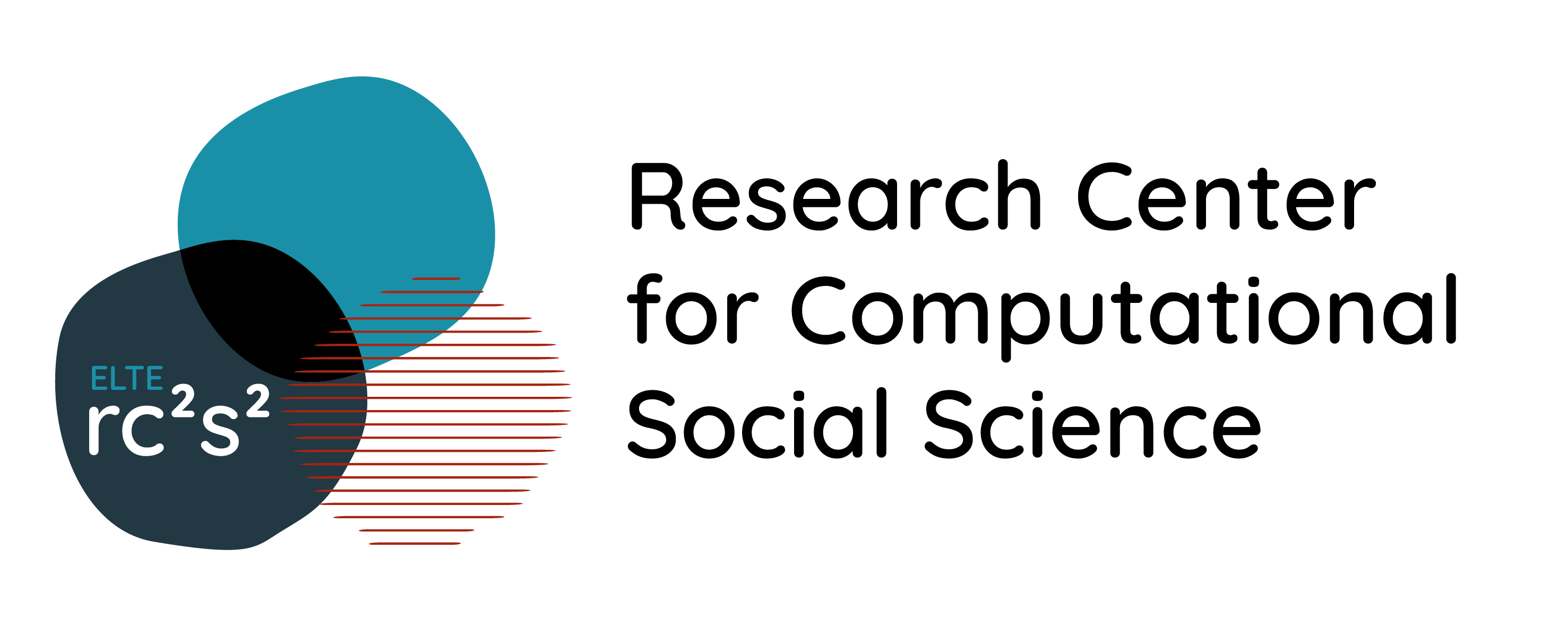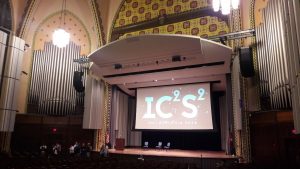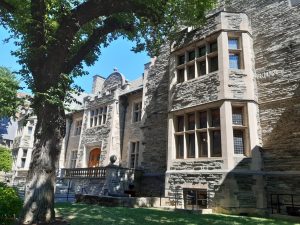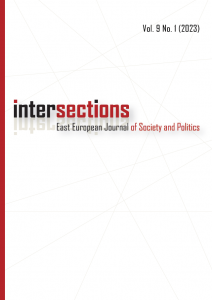Our research team was presented with three talks at the European Sociological Association’s conference in Porto, August 2024. Ildikó Barna, Renáta Németh, Jakab Buda (Shifting Narratives – Analyzing the Discursive Framing of Migration Connected to Russia’s War on Ukraine in Hungarian Online Media Using the Tools of Natural Language Processing, supported by the CELSA Research Fund), Zsófia Rakovics, Márton Rakovics (Critical Evaluation of Large Language Models as Survey Respondents), Domonkos Sik (Online Depression Forums: Beyond Medicalization and Psychologization Discourses).
Participation at the Etmaal Conference
2025.03.17. Presentation Representations of Migration in a Transforming EuropeRecent output of our Celsa Research Fund supported project with researchers from the University of Leuven at the Etmaal Communication Science Conference, 2025, 3-4 February, Bruges. Authors: Sercan Kiyak, Jakab Buda, Márton Gosztonyi, Cecil Meeusen, Renáta Németh, Ildikó Barna, and Leen d’Haenens. Title: Polarization to Consensus? A Comparative Analysis of Political Discourse on Refugees in Belgium and Hungary (2015-2022).
Jakab Buda gave a presentation at the CEU Doctoral Students Conference in Vienna
2024.04.17. Presentation The layers of political public sphere in Hungary (2001–2020)Jakab Buda, member of our research centre, gave a presentation at the CEU Doctoral Student Conference in Vienna on 17 April 2024, in connection with his doctoral research, entitled “The language of power – a machine learning based quantitative content analysis of 20 years of political discourse in the Hungarian parliament.” Abstracts and other presentations are available at the link below.
Renáta Németh’s book “The sociological possibilities of automated text processing” has been published and is available as e-learning material
2024.04.03. Publication Data Science in Social ResearchThe book “The Sociological Possibilities of Automated Text Processing” by Renáta Németh is published and available as an e-learning material by Savaria University Press. The book presents the increasingly popular “text as data” approach of recent years, allowing insight into the sociological applications of natural language processing through research conducted in our research group since 2018. The uniqueness of the book lies in the fact that, although there are excellent resources available to explain the technical aspects of NLP, the experiences and challenges in social research are less frequently discussed. The problems discussed in the book are embedded in a century-old research paradigm, and the issues raised are thus substantially different from those of computer science or industrial applications.
The book is available here (in Hungarian).
Eszter Katona presented her research co-authored by Renáta Németh at the EDC 2024 conference in Warsaw
2024.03.01. Presentation The layers of political public sphere in Hungary (2001–2020)Our research group member Eszter Katona was in Warsaw on 3 March, 2024, where she successfully presented her research at the EDC 2024 (Elections – Democracy – Crisis) conference (co-authored by Renáta Németh, supported by the New National Excellence Programme and the recently completed NKFIH-K research of our research group). Her presentation’s title was „Unveiling Geopolitical Shifts: The Evolution of the Carpathian Basin Discourse in Hungarian Parliament (1998-2020)”.
Zsófia Rakovics gave a presentation at the conTEXT conference
2023.11.14. Presentation The layers of political public sphere in Hungary (2001–2020)Zsófia Rakovics, a member of our research group, participated in the conTEXT conference organised by Clementine, where she spoke about the applications of word embeddings and large language models in social sciences. The conference took place at CEU on 14 November 2023, its Hungarian website can be accessed here.
Eszter Katona’s PhD theses was published in the latest issue of the Social Science Review
2023.11.13. PublicationThe doctoral thesis of Eszter Katona, a member of our research group, entitled “Natural Language Processing in Corruption Research – New Data Sources, New Methods, New Content Issues” was published in socio.hu: Social Science Review 2023/3.
The full text is available here.
Zsófia Rakovics and Hana Syla gave a presentation at the “20 Months After the Russian Invasion in Ukraine” international conference in Bucharest
2023.11.09. PresentationHana Syla and Zsófia Rakovics, as co-authors and as student and teacher, attended the “20 Months After the Russian Invasion in Ukraine. What Has Been Done, What Needs to Be Done in the Near Future, What Can Be Learned from the Past?” international conference on the topic of “Ukrainian Refugees – Political Communication and Public Perceptions”. The conference took place in Bucharest, Romania from 9 to 11 November, 2023.
The programme can be dowloaded from here.
Renáta Németh and Zsófia Rakovics gave a presentation at the SciComp23 conference
2023.11.07. Presentation The layers of political public sphere in Hungary (2001–2020)The newly established Institute of Scientific Computing held its first SciComp23 conference on 7-8 November 2023 in Budapest. Our research group was also represented at the conference by Zsófia Rakovics and Renáta Németh, who gave a presentation entitled “Some sociological applications of natural language processing”.
Our research group’s members participated at the Lessons and Legacies conference as presenters and organisers
2023.11.06. Presentation Digital LensTwo members of the Digital Lens research team, Alexandra Szabó and Eszter Katona, gave a presentation at the Lessons and Legacies conference in Prague, 6-8 November 2023. Ildikó Barna, the research leader, also played a key role in the conference organising committee.
Ildikó Barna presented her paper at the Jewish Studies Colloquium
2023.10.24. Presentation Digital LensThe Tauber Institute for the Study of European Jewry welcomed Ildikó Barna to the Jewish Studies Colloquium. She presented her paper “Interdisciplinary Exploration of Post-Holocaust History through Digital Tools: Opportunities and Limitations” on Tuesday, October 24, 2023.
Márton Rakovics gave a presentation at the University of Osijek
2023.09.18. Presentation The layers of political public sphere in Hungary (2001–2020)On 15 September 2023, Márton Rakovics, a member of our Research Centre (ELTE RC2S2), gave a lecture in English on the social science applications of natural language processing at the Faculty of Law, Josip Juraj Strossmayer University of Osijek, in Croatia. In his presentation, he introduced the most important text analytical methods used in computational social science and showed some of the results from RC2S2’s research project titled The layers of political public sphere in Hungary (2001–2020) funded by NKFIH (K-134428).
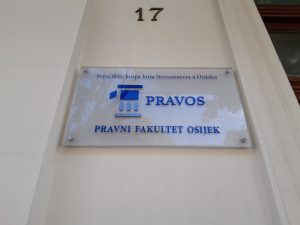
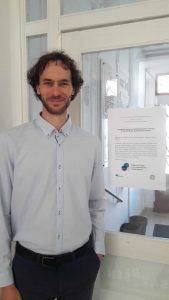
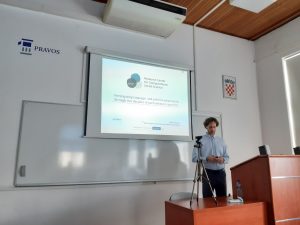
Conference poster presented at the 9th IC2S2 conference by Zsófia Rakovics and Márton Rakovics
2023.07.20. Presentation The layers of political public sphere in Hungary (2001–2020)Two members of our research center took part in the 9. International Conference on Computational Social Science (IC2S2) in Denmark. The event is organized by the University of Copenhagen in the Maersk Tower between 17-20th of July. Below we share some photos of the conference venue and atmosphere.
Zsófia Rakovics and Márton Rakovics presented a poster on language- and political polarization of parliamentary speeches between 1998 and 2020. The examined corpus is related to the research of RC2S2, that is part of an NRCS-funded project The layers of political public sphere in Hungary (2001-2020).
Additional information:
The conference program is available here
Zsófia Rakovics gave a presentation at the ISA World Congress of Sociology in Melbourne
2023.06.30. Presentation The layers of political public sphere in Hungary (2001–2020)Zsófia Rakovics gave az online presentation at the ISA (International Sociological Association) World Congress organised in Melbourne between 25th June – 1st July, 2023. The title of the presentation was Investigating Language- and Political Polarization through Two Decades of Parliamentary Speeches.
More details:
Abstract is available here
The conference’s site
Zsófia Rakovics gave a presentation at the ISA World Congress of Sociology in Melbourne
2023.06.30. Presentation The layers of political public sphere in Hungary (2001–2020)Zsófia Rakovics gave an online presentation at the ISA (International Sociological Association) World Congress organised in Melbourne between 25th June – 1st July, 2023. The title of the presentation was Investigating Dynamic Social Networks of Politicians Constructed By the Similarity of Their Speeches.
More details:
Abstract is available here
The conference’s site
Renáta Németh gave a presentation at the ISA World Congress of Sociology in Melbourne
2023.06.30. Presentation The layers of political public sphere in Hungary (2001–2020)Renáta Németh gave az online presentation at the ISA (International Sociological Association) World Congress organised in Melbourne between 25th June – 1st July, 2023. The title of the presentation is The language of discrimination: Assessing attention discrimination by Hungarian local governments using machine learning, the authors were Renáta Németh (ELTE TáTK RC2S2), Jakab Buda (ELTE TáTK RC2S2) and Bori Simonovits (ELTE PPK).
More details:
Abstract is available here
The conference’s site
Ildikó Barna gave a presentation at the ISA World Congress of Sociology in Melbourne
2023.06.30. Presentation The layers of political public sphere in Hungary (2001–2020)Ildikó Barna gave az online presentation at the ISA (International Sociological Association) World Congress organised in Melbourne between 25th June – 1st July, 2023. The title of the presentation is Examining the Different Political Sides’ Memorialization of Using Tools of Natural Language Processing and Narrative Psychology, the authors were Ildikó Barna (ELTE TáTK RC2S2), Renáta Németh (ELTE TáTK RC2S2), Tibor Pólya (ELKH TTK, Institute of Cognitive Neuroscience and Psychology, Narrative and Historical Psychology Research Group) and Réka Berbekár (ELTE TáTK).
More details:
The abstract is available here
The conference’s site
Ildikó Barna gave a presentation at the EuMePo (European Memory Politics) Jean Monnet Network conference organised in Budapest
2023.06.15. Presentation The layers of political public sphere in Hungary (2001–2020)Ildikó Barna gave a presentation titled “An analysis on the framing of Trianon and the Holocaust in Hungary using Natural Language Processing” at the EuMePo (European Memory Politics) Jean Monnet Network conference on 15th June, 2023, Budapest, co-authored by Árpád Knap. In their research, they examined the discursive framing of Trianon and the Holocaust in today’s Hungarian online media. Their corpus contained 26,519 articles connected to these two historical events published between September 2017 and September 2020. They used a mixed-method approach by combining LDA (Latent Dirichlet Allocation) topic models and qualitative methods. Their aim was not only to map the latent thematic structure and the discourses about Trianon and the Holocaust but also to identify the main differences in the rhetoric of the different sides of the political spectrum. They identified many discursive differences between the rhetoric of the different political sides. Yet, the different relationship to emotions has the most far-reaching consequences. In the far-right and progovernment media, emotions play an essential role, while the rhetoric featured in the nongovernment media, detaches itself from emotions.
Ildikó Barna’s work was supported by the K-134428 NKFIH grant, and Árpád Knap’s work was supported by the EuMePo Jean Monnet Network (Erasmus+ Programme of the European Union) and NKFIH New National Excellence Program.
Renáta Németh gave a presentation at the EuMePo (European Memory Politics) Jean Monnet Network conference organised in Budapest
2023.06.15. Presentation The layers of political public sphere in Hungary (2001–2020)Renáta Németh gave a presentation titled “Who knows it better? The task of detecting discrimination using human coding vs. text mining” at the EuMePo (European Memory Politics) Jean Monnet Network conference on 15th June, 2023, Budapest. The co-authors were Jakab Buda and Bori Simonovits. In their study they assess the responsiveness of Hungarian local governments to requests for information by Roma and non-Roma clients, relying on a nationwide email study that applied a randomized controlled trial design. Two methods were used in parallel to evaluate the response emails in parallel: traditional qualitative coding and machine learning (ML). Both methods provided evidence of attention discrimination. Our ML models worked significantly better compared to random classification, confirming the differential treatment of Roma clients. The most important predictors showed that the answers sent to ostensibly Roma clients are not only shorter, but their tone is less polite and more reserved, supporting the idea of attention discrimination. A higher level of attention discrimination is detectable against male senders, and in smaller settlements.
The study showed that it is possible to detect discrimination in textual data in an automated way without human coding, and that ML may detect linguistic features of discrimination that human coders may not recognize. To the best of the authors’ knowledge, the study is the first attempt to assess discrimination using ML techniques.
Renáta Németh’s and Jakab Buda’s work was supported by the K-134428 NKFIH grant, and Bori Simonovits’s work was supported by the FK-12798 NKFIH grant.
Zsófia Rakovics gave a presentation at the EuMePo (European Memory Politics) Jean Monnet Network conference organised in Budapest
2023.06.15. Presentation The layers of political public sphere in Hungary (2001–2020)Zsófia Rakovics gave a presentation titled “Memory politics – Different issues and political communication strategies in the Hungarian Parliament” at the EuMePo (European Memory Politics) Jean Monnet Network conference on 15th June, 2023, Budapest. The motivation of the research is to analyze the themes of memory politics and the dynamics of their occurrence in the Hungarian National Assembly and reveal the communication strategies of political parties. The corpus under study contains parliamentary speeches from 1998 to 2020, hundreds of thousands of texts. In addition to the transcripts, metadata is also available; including the date, type, length of the speeches, the name and party of the speakers, which are used for the analysis. The research is conducted by using natural language processing tools, relying on automated quantitative analysis of large amounts of textual data. The study takes an exploratory approach, uses structural topic models (STMs) to investigate the emergence and dynamics of different memory politics related themes. This method simultaneously identifies thematic text clusters, and communication patterns, while capturing semantic and syntactic features. The modeling is performed in two steps: first, for the whole corpus, and second, for the speeches that most typically belong to the topic of memory politics. In both models, time is handled as an explanatory variable in the analysis, considering temporal variation and dynamics. In the data-driven analysis, the memory policy strategies of parliamentary parties, and their changes over time can be investigated on the speeches.
The results point to the political communication turnaround in 2010, highlighting the difference between the language before and after 2010. This year marks a turning point for almost all parties, both in terms of general discourse and in terms of the political themes of memory. The results also confirm the preliminary assumptions for each parliamentary party, illustrating the differences in their memory politics and communication mechanisms.
The author’s work was supported by ÚNKP and she also got non-financial supporter from the NKFIH grant K-134428.
Németh, Renáta; Sik, Domonkos; Zaboretzky, Bendegúz and Katona, Eszter (2023): Depression in times of a pandemic – the impact of COVID-19 on the lay discourses of e-mental health communities
2023.06.15. Publication Discursive framing of depression in online health communitiesThe article by Renáta Németh, Domonkos Sik, Bendegúz Zaboretzky and Eszter Katona entitled “Depression in times of a pandemic – the impact of COVID-19 on the lay discourses of e-mental health communities” was published in the journal Information, Communication & Society.
Németh, Renáta and Koltai, Júlia (2023): Natural language processing: The integration of a new methodological paradigm into sociology
2023.06.15. Publication The layers of political public sphere in Hungary (2001–2020)Renáta Németh and Júlia Koltai’s article entitled “Natural language processing: the integration of a new methodological paradigm into sociology” was published inthe journal Intersections: East European Journal of Society and Politics. Renáta Németh, one of the authors of the article, wrote the article with the support of our NKFIH research, as a methodological basis for the research.
Sik, Domonkos (2023): Populist Juggling with Fear: The Case of Hungary
2023.03.08. Publication The layers of political public sphere in Hungary (2001–2020)Domonkos Sik published his results in the journal called East European Politics and Societies: and Cultures with the following title: ” Populist Juggling with Fear: The Case of Hungary”.
Rakovics, Zsófia (2023): Memory Politics in the Hungarian Parliament
2023.02.11. Presentation The layers of political public sphere in Hungary (2001–2020)Zsófia Rakovics gave a presentation entitled ” Memory Politics in the Hungarian Parliament ” at the CENTRAL Workshop: Notion and Construction of Victimhood in Central East and Southeast Europe, held in Vienna, 8-11 February 2023.
Katona, Eszter and Németh, Renáta (2023): Carpathian Basin-related topics in Hungarian parliamentary speeches. A concept related to Hungary’s self-definition Katona, Eszter and Németh, Renáta (2023): Carpathian Basin-related topics in Hungarian parliamentary speeches. A concept related to Hungary’s self-definition
2023.02.11. Presentation The layers of political public sphere in Hungary (2001–2020)Eszter Katona and Renáta Németh gave a presentation entitled ” Carpathian Basin-related topics in Hungarian parliamentary speeches. A concept related to Hungary’s self-definition ” at the CENTRAL Workshop: Notion and Construction of Victimhood in Central East and Southeast Europe, held in Vienna, 8-11 February 2023.
Boda, Zsuzsanna and Rakovics, Zsófia (2022): Analysis of Viktor Orbán’s speeches between 2010 and 2020: Investigating the issue of migration
2022.12.12. Publication The layers of political public sphere in Hungary (2001–2020)Zsuzsanna Boda and Zsófia Rakovics published their results in the journal Szociológiai Szemle with the following title: ” Analysis of Viktor Orbán’s speeches between 2010 and 2020: Investigating the issue of migration”.
Németh, Renáta (2022): A scoping review on the use of natural language processing in research on political polarization: trends and research prospects
2022.11.29. Publication The layers of political public sphere in Hungary (2001–2020)Renáta Németh published her results in the Journal of Computational Social Science with the following title: “A scoping review on the use of natural language processing in research on political polarization: trends and research prospects”.
Lecture by Domonkos Sik at the conference “Fundamental Issues of Social Theory”
2022.11.04. Előadás The layers of political public sphere in Hungary (2001–2020)Domonkos Sik gave a conference presentation entitled “The autonomy of poiesis – the interaction of social structures and discursive possibilities” at the conference “The Fundamental issues of social theory” at the National University of Public Service (3-4 November 2022).
